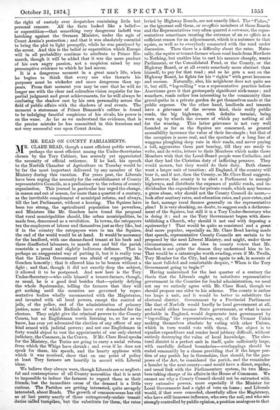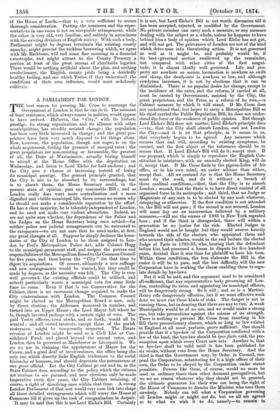MR. READ ON COUNTY PARLT A 'VENTS.
MR. CLARE READ, though a most efficient public servant, perhaps the most efficient among the Under-Secretaries chosen by the Tory Cabinet, has scarcely yet appreciated the necessity of official reticence. If he had, his speech to the Norfolk Chamber of Agriculture on Tuesday would be by far the most important delivered by any member of the Ministry during this vacation. For years past, the Liberals have been urging the necessity for the establishment of County representative Councils, as a preliminary to the reform of county organisation. This journal in _particular has urged the change, in season and out of season, for more than a quarter of a century, as the inevitable complement of municipal reform' and always, till the last Parliament, without a hearing. The Squires have been too strong, the agricultural population too powerless, and Ministers like Mr. Goschen have found the proposal that rural municipalities should, like urban municipalities, be made free, denounced as a revolution. In towns, the ratepayers tax the employers of labour and themselves just as they like, but if in the country the ratepayers were to tax the Squires, the end of the world would be at hand. It would be necessary for the landlord, with one shame-faced tenant at his back and three disaffected labourers, to march out and bid the parish constable a proud and slightly ludicrous defiance. That is perhaps an exaggerated way of putting it, but it is really true that the Liberal Government was afraid of supporting Mr. Goschen honestly ; that it allowed him to be beaten without a fight ; and that, though it did not exactly drop the subject, it allowed it to be postponed. And now here is the Tory Under-Secretary—who calls himself a tenant-farmer, though, as usual, he is a good deal besides that—quietly defying the whole Squirearchy, telling the farmers that they will get nothing until the counties are governed by repre- sentative bodies wholly unconnected with the Magistrates, and invented with all local powers, except the control of jails, of the police, and of the administration of primary justice, none of which Radicals have ever demanded for the electors. They might give the criminal powers to the County Courts, but no Englishman worth listening to, 80 far as we know, has ever yet advocated the election of any officer of any kind armed with judicial powers; and not one Englishman in forty would object to vest the appointment of our only elected judiciary, the Coroners, in the Crown. If Mr. Clare Read speaks for the Ministry, the Tories are going to carry a social reform from which the Whigs have shrunk ; and even if he does not speak for them, his speech, and the hearty applause with which it was received, show that on one point of policy at least Tory farmers are heartily in accord with Liberal ideas.
We believe they always were, though Liberals are so neglect- ful and contemptuous of all County necessities that it is next to impossible to induce the farmers to regard them as their friends, but the immediate cause of the demand is a little curious. The Parishes are getting interested, quite savagely interested, about Roads. The growth of common-sense has rid us at last pretty nearly of those outrageously-unfair transit duties called turnpikes, but the substitute for them, the rates
levied by Highway Boards, are not exactly liked. The "Fishes," as the ignorant call them, or ex-officio members of those Boards and the Representatives very often quarrel a out rance, the repre- sentatives sometimes treating the entrance of an ex officio as a sufficient reason for an adjournment, which is a nuisance to that squire, as well as to everybody connected with the road under discussion. Then there is a difficulty about the rates. Natu- rally, the squire or tenant-farmer whose road leads from Nowhere to Nothing, but enables him to cart his manure cheaply, wants Parliament, or the Consolidated Fund, or the County, or the Highway Board, or at all events somebody more abstract than himself, to pay for that road ; and as he gets a seat on the Highway Board, he fights for his " rights " with great keenness and success. Naturally, also, his neighbour does not quite see it, but still, " log-rolling " was a representative practice before Americans gave it that grotesquely significant nick-name ; and somehow, roads rather less interesting to the community than gravel-paths in a private garden do get themselves made at the public expense. On the other hand, landlords and tenants have a grievance of the reverse kind, their really public roads, the big highways, with definite termini, being worn up by wheels the owners of which pay nothing at all for the wearing. This latter grievance is not very well founded as far as the Squires are concerned, as general accessibility increases the value of their fee-simple ; but that of the occupiers is more real, and the spectacle of a long line of waggons ploughing deep ruts in their roads, and never paying a toll, aggravates them past bearing, till they are ready to write, and do write, letters to their Members which make those Members wish that the Local-Board people were Catholics, and that they had the Christian duty of inflicting penance. They would mourn, but they would do their duty. Both classes want a larger unit of taxation; all England, if the country will bear it, and if not, then the County, as Mr. Clare Read suggests. If, however, the county is to elect a Parliament to manage highways, and distribute the expenses of public roads, and in- dividualise the expenditure for private roads, which may become a gross abuse, why should not the County Council do more,— look after sanitary rates, and education rates, and poor-rates, and in fact, manage rural finance generally on the representative plan It is very shocking, no doubt, to suggest such a dethrone- ment of the Squires, but still it is a Tory Under-Secretary who is doing it ; and as the Tory Government began with dises- tablishing a Church, why should it not end with deposing a squirearchy ? That would be quite as consistent' and a great deal more popular, especially as, Mr. Clare Read having made that speech, representative County Councils are certain to be proposed by the next Liberal Ministry, and might, under those circumstances, create an idea in county voters that Mr. Goschen is not quite the demon they understood him to be. That would be a catastrophe worth evading, even if Mr. Twells, Tory Member for the City, had once again to ask, in accents of the most full-fed and comfortable despair, "When is the Tory Government going to begin ?"
Having maintained for the last quarter of a century the thesis that the Liberals ought to substitute representative government in the Counties for feudal administration, we need not say we entirely agree with Mr. Clare Read, though we should propose one rider to his scheme. The county is rather too large a unit, and it would be better to substitute the electoral district. Government by a Provincial Parliament like that of Norfolk would hardly be local government at all, and would either become State government, or what is more probable in England, would degenerate into government by "log-rolling," the representatives, say, of the Cromer Union making themselves absolute by voting with other Unions, which in turn would vote with them. The object is to equalise expenditure and render local jobbery difficult, without entirely destroying the value of local knowledge. The elec- toral district is a perfect unit in itself, quite sufficiently large, with carefully defined boundaries—overlappings should be ended summarily by a clause providing that if the larger por- tion of any parish lay in Greenshire, that should, for the pur- poses of the Act, be considered the parish, and the remainder a hamlet in the next county—and would have a direct, regular, and usual link with the Parliamentary system, its two Mem- bers taking charge of its affairs in the House of Commons. We cannot see why a County Council should not be entrusted with very extensive powers, more especially if the Minister for Local Government had a right of veto on loans ; and Liberala would, if that were conceded, cheerfully allow the Magistracy, who have still immense influence, who own the soil, and who are strongly controlled by public opinion, a position analogous to that
of the House of Lords,—that is, a veto sufficient to secure thorough consideration. Putting the nominees and the repre- sentatives in one room is not an acceptable arrangement, while the other is very old, very familiar, and entirely in accordance with the existing divisions of English society. With such a body, Parliament might by degrees terminate the existing county anarchy, might prevent the reckless borrowing which, we agree with Mr. Rathbone, will end some fine morning in a financial catastrophe, and might attract to the County Treasury a portion at least of the great stream of charitable legacies. There would be nothing artificial about the plan, and nothing revolutionary, the English county pride being a decidedly healthy feeling, and one which Tories, if they understood the conditions of their own influence, would most sedulously cultivate.







































 Previous page
Previous page